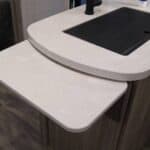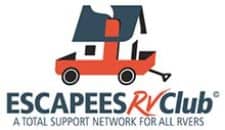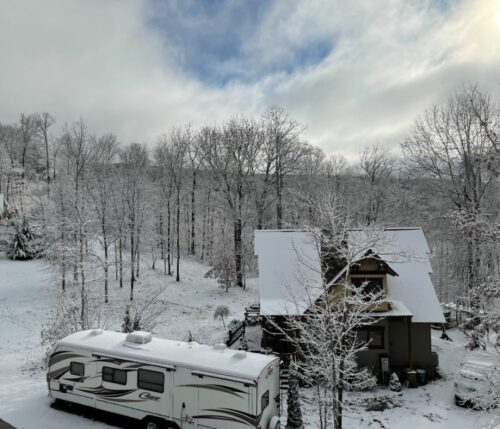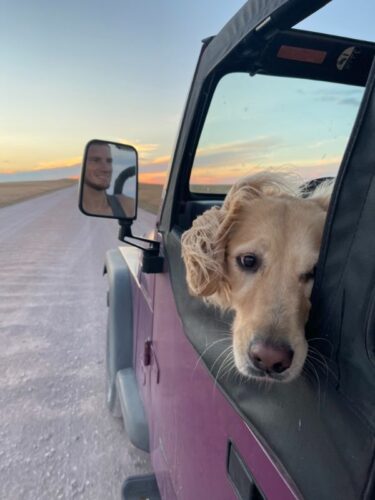Traveling down Highway 1 along California? Or maybe you’re interested in hitting up the Atlantic East Coast, from New York to Florida? In any case, you’ll find some amazing beaches that will lure you in and keep you happily stranded! Thankfully, there are some great ways to save on money and time by staying at some incredible beaches.
I’ve spent months of my life camping alongside Mediterranean beaches in my 1988 Hymer motorhome. Let me share with you 19 wild beach camping tips to help you get the best out of your wild RV experience. By “wild,” I mean leaving all the luxury of campsites and simply enjoying natural beauty. And by “wild camping,” that’s what Anglo-Europeans call boondocking, dispersed camping, or dry camping.

TIPS FOR SAVING WATER WHILE DRY CAMPING AT THE BEACH
1. Fill Up Your Freshwater Tank
Water will be your most valuable resource. If you plan on finding a place to park your RV for a while and stay in one location for multiple days, make sure you fill up on water before heading off. Just remember that waters weighs 8.3 pounds per gallon (or 2.21 pounds, or 1 kilogram, per liter). Make sure you don’t exceed the cargo capacity of your rig!
If you plan to filter your water, just remember that most mechanical filters don’t filter out salt or heavy metal contaminants. You can’t filter ocean water through most backpacking filters!
2. Dump Your Tanks Before!
Empty the gray and black tanks before heading off to the coast. You will need to limit the amount of flushing you will be doing. Remember, you won’t be able to dump these tanks anywhere, even if your gray tank. No dumping within a quarter mile of most bodies of water! If you need to plan for an extended stay, bring a portable waste tank.
3. Rinse Your Feet in a Bucket
While I was travelling the Italian coast and driving southward along the Spanish coast, my wife and I developed a very good way to save time cleaning the sand out of our car. We purchased a small bucket that fit around 4 gallons of water. We put this bucket right outside our camper door. Every time we returned from swimming or walking the beach, we would wash our feet in the bucket, which was filled with ocean water. This drastically reduced the amount of sand entering our RV, while also preventing the eventual damage done by sand getting into the small furniture cracks and crevices. And because sand drops to the bottom of the bucket, the same 4 gallons of water can last you for an entire stay!
4. Use Disinfectant Water to Clean Hands
You’ll also need to take into consideration that continuously washing your hands will empty your freshwater tank too quickly. In turn, your grey water tank will also fill quickly.
My wife and I purchased a smaller, shallower pan that held around two gallons of water. I added two caps full of bleach. We used this disinfectant water to scrub our hands before eating and do a last-minute disinfection of our plates. This greatly improved how long we could stay at the beach with our freshwater reservoir draining much more slowly!
5. Pack Drinking Water in Bulk
Instead of buying multiple small plastic bottles, I would recommend getting a 5-gallon drinking water jug or collapsible water tankb/ladder. This will limit the amount of plastic you are using, and it will reduce the amount of trash you need to pack out after an elongated stay. Remember, you will need to take all your trash out with you (leave no trace!), and having multiple plastic bottles filled with air will take up a lot of space.
6. Shower El Naturel
Instead of using the fresh water in your camper tank, you can always run into the ocean or lake and do a quick wipe-off. In winter this will be more difficult, but if you have the heater on in your RV and warm clothes waiting, it’s not too bad. You’ll have an exciting jolt of energy from the cold water. You definitely won’t need your morning coffee if you take a cold bath in the ocean!
TIPS FOR FOOD AND GROCERIES WHILE BOONDOCKING AT THE BEACH
7. Choose Non-Perishable Foods
Space is always a factor to think about when planning an elongated stay at the beach. No matter how big your RV may be and how much storage space you have, there are always ways to save. Instead of having food products with bulky packaging like cans or bags, my wife and I used reusable fabric bags to store our pasta, fruit and other items. For drinks, we always bought aluminum cans instead of plastic or bottles because you can crush the cans to be more compact. Plus, aluminum is more easily recycled.
8. Consume Dry Foods
Make sure to choose foods that don’t require water to prepare. Using foods like pasta or rice will require you to cook them with water, which is a valuable resource when camping in the wild. If you do find yourself cooking pasta, use the water to do the washing up after you eat.
9. Eat Fresh Fruits and Vegetables
My wife and I always stocked up on a lot of fruit and vegetables before we would head into the wild. This helped with reducing trash while also saving on cooking – no packaging to throw away! If you find yourself in need of something heavier, sliced bread and lunch meat is always a good go to.
10. Fish for Fun/Food

I was given a fishing pole by an Italian man while in Genoa, Italy. Fortunately I was able to use it to catch fish, which made for some great dinners along our travels. This is also a great way to pass the time and soak in some rays while taking advantage of your beach adventures.
TIPS FOR CHOOSING A SITE WHILE PRIMITIVE CAMPING AT THE BEACH
11. Park Above the Tideline
Make sure that where you park isn’t too close to the ocean. I parked too close to the ocean in Las Negras, Spain while the tide was out. When I noticed the ocean lapping at my wheels, I had to quickly move my RV before the tires became submerged by ocean water! This isn’t good for rust prevention! Ocean water will rust your RV in a blink!
12. Stow Away the Awning at Night
I think that it is well known that storms coming in from the ocean can carry strong winds and heavy rain. Therefore, if you have your awning out, always remember to reel it in as night. Wind gusts can come off the ocean and tear the awning and make it very difficult to put back into place. Remember, most awnings are only rated for up to 15-mph winds!
The same goes for anyone who has a VW Camper where the roof lifts to make a bed. If it is too windy, I recommend putting the raised roof down to prevent the latches from breaking under strong winds.
13. Don’t Feed the Animals
Along most coastlines that are still wild and less industrial, wild animals will be something to consider. I remember while I was parked in a small bay off the coast of Portugal, a fox decided to join our nightly bonfire. It ended up stealing all of our onions and potatoes overnight. It subsequently came every night hence forth to continue its quest for fresh food.
To prevent this, make sure all trash is either hung high, or in your van. Racoons will commonly frequent beaches with lots of food and trash, and they’ll figure out how to open coolers and dump buckets. If you’re in an area with bears or mountain lions, hang your trash in a tree nearby. In some areas of the Pacific Northwest, you will be required to use bear canisters.
14. Think About the Mud!

Both of these go hand in hand. I drove my 1988 Hymer down a very steep hill to reach a secluded beach in Portugal. There was no one in sight and the closest town was six or seven miles away. I didn’t think about the fact that I would need to ascend this road on my way out. We had a pretty heavy rainstorm come through which turned the road to mud. This mud lasted for days, way beyond our food and water reserves. We had to wait until the mud had dried to even try and leave. And even then, my RV was too heavy to make the climb.
So, what am I getting at? Always survey the descent to a beach and consider the condition of the road, the weight of your RV, and the engine power it has. If you’ll be driving on mud or sand, you’ll probably need to deflate your tires. If you’re in doubt about any of these, maybe it is best to find another wild beach.
LEAVING YOUR SANDY OASIS AFTER WILD CAMPING
15. Leave No Trace!
Please, for the sake of the environment, make sure you clean up! Make sure all your trash has been picked up, that all tank valves are closed and you’re not leaving anything behind. Once you make it back to civilization, you can dump your trash and grey/black water in the appropriate locations.
16. Clean the Underside of Your RV
The salt in the sand will cause the metal under your RV to rust. I would recommend finding a car wash and paying the extra few dollars to have the underside of your RV thoroughly cleaned to prevent corrosion. If you frequent oceanic areas, you might want to get your RV undercoated.
17. Properly Clean the Roof
If you were surfing or doing any other ocean sports which requires you to store the components on top of your van, make sure to properly wash the roof of your RV. This will also prevent rusting and pain damage.

18. Sand, Sand, Sand
After a long time at the ocean I would find sand in the strangest places, somehow sand has a magical way to find the smallest places. To properly clean the pipes in my RV, I would open the grey water tank in the proper dumping facilities and pour an immense amount of water down the sinks to make sure all the sand was out of the pipes and not causing any blockages or damage. You should do the same with the fresh water tank. This will help maintain the water pump as well.
19. Vacuum Last
Before you head to your next destination, be sure to vacuum the sand out of your RV! Get the sofas, chairs, sink areas and rugs. Do a thorough cleaning of every section of your RV. This will ensure the sand won’t slowly degrade the seals at connecting points.
***
Going to the beach for a few days or even for a few weeks is always great. Whether you’re alone, with your family or with other campers, you’re sure to have an awesome time. Don’t forget to bring enough sun block for the stay and enough toys for the kids should there be any. As summer is getting closer, enjoy the open waters and good luck RVing
Bilingual Spanish and English writer. I lived in a RV for a year while traveling through Germany, Switzerland, Italy, France, Andorra, Spain, Portugal.
-
Sean Maukhttps://changingears.com/author/sean-mauk/
-
Sean Maukhttps://changingears.com/author/sean-mauk/
-
Sean Maukhttps://changingears.com/author/sean-mauk/
-
Sean Maukhttps://changingears.com/author/sean-mauk/










